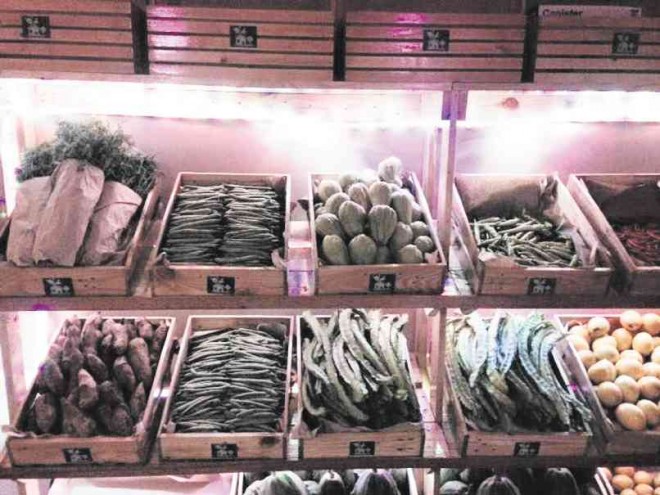In Laguna, affordable organic produce

SAFE CROPS The Laguna agricultural office has tied up with O and R Freshly Pick in Sta. Cruz town to sell organically and locally produced vegetables, and is convincing more businessmen, as well as municipal and city government units, to open similar outlets. MARLON TOBIAS/CONTRIBUTOR
Laguna is priming a portal for organic farming this year, an effort which, according to the provincial agriculturist, requires a shift in the thinking of farmers, traders and consumers.
In Sta. Cruz town, the province’s capital, the first “salad bar” and organic retail store of “naturally grown” vegetables, fruits, meat, brown rice, citronella and coffee has started catering to the public. The crops are produced by farmers who have undergone training with the provincial government.
In partnership with local traders, the provincial government opened its first organic retail store, the privately run O and R Freshly Pick (from Olive Prieto and Rose Ogania), in Barangay (village) Bubukal in Sta. Cruz on Dec. 18 last year. The store started serving cooked meals using organic meat and ingredients on Jan. 20.
“People have this thinking that organic products are costly and cater only to the well-off,” provincial agriculturist Marlon Tobias says. “So we agreed to make the products affordable, setting the price between that of supermarkets and the public markets.”
For instance, Tobias says, a pomelo, which costs P75 in the supermarket, is sold for only P35.”
Control system
The retail store is just one of the many programs in the pipeline under Laguna’s organic agriculture program.
In January, the provincial government formed a five-member team for its Laguna Internal Control System (LICS). Tobias explained that the LICS would function as a certifying body to mark with stickers all organic products coming from Laguna.
The agricultural office will also put into operation a trading center or bagsakan of organic products in Barangay Lamot 2 in Calauan town by March.
“All organic produce will be brought (to the center), where they will be marked, packed and marketed to investors,” Tobias says.
The 2010 Organic Agriculture Act mandates state agencies to develop and promote organic farming. “But even before that, organic farming has always been our advocacy,” says Tobias, 53, who has been the province’s chief agriculturist since 2003.
Different names
Laguna has had programs for organic farming, though under different names, depending on the incumbent leadership.
In the late ’90s, then Gov. Joey Lina launched FAITH (Food Always in the Home), but it was renamed in 2003 under then Gov. Teresita Lazaro into Laguna Agricultural Program.
In 2011, then Gov. Jeorge “ER” Ejercito launched the ER Farm (Eco-friendly and Recreational Family Agricultural Resource Management), which was adopted by his successor, Ramil Hernandez, but rebranded Laguna Center for Organic Agriculture.
Laguna has about 60,000 farmers, only around 1,200 of whom are practicing the organic method, according to the provincial government. Most of them are in the smaller and agriculture-dependents municipalities in the third and fourth districts or in the upland villages in Cabuyao and Calamba cities.
“I always say (to the farmers) that you may not have the money, but you should have the perseverance,” Tobias says.
Social concern
Organic agriculture does away with synthetic and chemical fertilizers, hence the produce are safer and cheaper. But production takes longer. “It takes about four days with a chemical fertilizer, but half a month with an organic system,” Tobias points out.
The provincial agricultural office receives support from the Department of Agriculture (DA) for equipment and facilities, and technical expertise from the Agricultural Training Institute, a DA-attached agency. It is also talking with each municipality and city for them to open their own organic retail store all over Laguna.
“People are used to the conventional farming when in fact, organic farming is cheaper in the long run,” Tobias says.
“Besides, it’s also every farmer’s social concern to reduce environmental pollution and produce safer food,” he says.